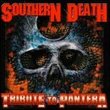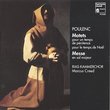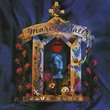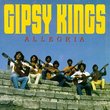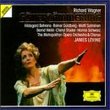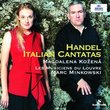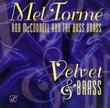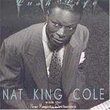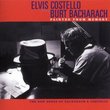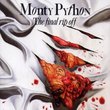| All Artists: Ludwig van Beethoven, Nikolaus Harnoncourt, Chamber Orchestra of Europe, Charlotte Margiono, Rudolf Schasching Title: Beethoven-Harnoncourt: 9 Symphonies Members Wishing: 0 Total Copies: 0 Label: Teldec Release Date: 10/11/1991 Album Type: Box set Genre: Classical Styles: Historical Periods, Classical (c.1770-1830), Symphonies Number of Discs: 5 SwapaCD Credits: 5 UPC: 022924645228 |
Search - Ludwig van Beethoven, Nikolaus Harnoncourt, Chamber Orchestra of Europe :: Beethoven-Harnoncourt: 9 Symphonies
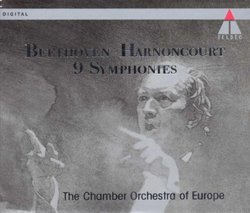 | Ludwig van Beethoven, Nikolaus Harnoncourt, Chamber Orchestra of Europe Beethoven-Harnoncourt: 9 Symphonies Genre: Classical
When it was first released in 1991, this set created a furor. Nikolaus Harnoncourt is famous as one of the pioneers of the "authentic instrument" movement, but he is also a musician of deep insight and strong, sometimes... more » |
Larger Image |
CD DetailsSynopsis
Amazon.com When it was first released in 1991, this set created a furor. Nikolaus Harnoncourt is famous as one of the pioneers of the "authentic instrument" movement, but he is also a musician of deep insight and strong, sometimes willful, interpretive gifts. He opts here for modern instruments played in period style for strings and winds, but mixes them with antique brass and percussion. The result is a truly fresh look at Beethoven that has worn well over time. Harnoncourt naturally excels in the early works--the ones closest to his 18th-century period of specialization. But he succeeds equally in the Big Conductor Test pieces, like the Fifth and Seventh. The performances of the Sixth and Ninth are more controversial, one being extremely relaxed (it is the Pastoral symphony after all), the other a bit lightweight. The sum total, however, remains a major statement by one of the most provocative and important conductors of our time. --David Hurwitz Similar CDs
Similarly Requested CDs
|
CD ReviewsExcellent Beethoven Gregory M. Zinkl | Chicago, IL | 08/07/2000 (5 out of 5 stars) "I paid full price for this set when I was a broke graduate student. It was an investment definitely worth making!Harnoncourt's conducting can be quite tiring; accents way overdone, tempi rushed here, phrases dragged there. But this recording, well, Harnoncourt emerges as one of The Great Beethoven interpreters.Let's start off with the approach. It's a compromise between period instruments and modern instruments. For the most part, it's all modern instruments that play in an "authentik" style. My predisposed response would usually be: "Well, that's doomed for failure!" Turns out, that response would not have considered the brilliance of the Chamber Orchestra of Europe, an amazing ensemble that is as chimeric as you desire. They execute Harnoncourt's conception with blazing intensity, accuracy, and enthusiasm.Harnoncourt's conception: a little more quick than most, maybe slower than some conductors with period bands, but it's all wonderful. Take symphonies 1 and 2. Masterpieces that aren't performed enough. They smile in his hands. They startle. They provoke. That's what they should be! Have you noticed the very first two chords of No. 1? Geez, what was LvB thinking of? They symphony sounds like it should end before it's started--and Harnoncourt gives you that impression.And so it goes. Other reviewers seemed to have found No. 6 eccentric. I find it to be wonderful, and totally different than my expectations (which were: dismal failure. He'll go too fast, or be pushy). It bubbles and gurgles! No. 9 is the only one that didn't wow me, but it's hardly a bad peformance. Furtwangler really has a stranglehold on the ninth for me.Wonderful music, great engineering, good documentation." Finest Beethoven cycle for sure. J. Luis Juarez Echenique | Mexico City | 04/30/2000 (5 out of 5 stars) "Harnoncourt sees the Beethoven symphonies from the XVIII Century onwards, rather than from Bruckner backwards. The gain is obvious: clearer string lines, woodwinds and brass far better balanced (remember that Toscanini used to double them and what a mess they made). The playing of the Chamber Orchestra of Europe is of the highest order, they easily match the BPO or the VPO in their finest days. Harnoncourt is very consistent through out, there are no "weak" movements in any symphony, let alone a whole symphony that is less than excellent. Please disregard the Gramophone recommendation which would like you to believe that Sir Colin Davis recent Staatskapelle cycle in Philips is the best digital version, of course it's not. Davis is no longer the exciting conductor he was in the 60's, now Harnoncourt leads the way into Beethoven's sound world. By the way, if you want to complement Harnoncourt's vision try to add to your collection Jordi Savall's fiery "Eroica" in Auvidis and Herreweghe's Ninth Symphony in Harmonia Mundi." Very good/interesting set of Beethoven's symphonies Aaron | Maryland, USA | 11/10/2005 (5 out of 5 stars) "Overall, I'd highly recommend Harnoncourt's cycle.
First, a little about the overall character: The symphonies are performed on a mid-sized orchestra using modern instruments (except for the horns), but with certain period performing practices. For example, there is noticably less vibrato than normal, and tempos tend to be a bit brisker than most modern instrument performances. Harnoncourt has a very individual approach, and every symphony has at least one or two surprises. Finally, for those who find it important (like me), all repeats are included. Now, for the individual symphonies: 1, 2, & 4: I don't have vast knowledge of what these three symphonies sound like on other disks, but I think they sound great here, and are all my #1 versions. 3: The first two movements are taken on the fast side, and aside from some obscured detail in one part of the first movement, come off very well. In the first movement, the horns at the very end of the development blare so triumphantly it literally startled me the first couple of times. The last movements are pretty much standard, and also very good. My favorite so far. 5: An excellent version. I've never heard the oboe solo in the first movement sound as emotionally powerful as it does here. This version and Kleiber's are my favorites. 6: This is the most complained-about part of this set. I actually have no objections to this version, though I haven't heard any of the versions frequently cited as the best. 7: Kleiber's version is just plain better in my opinion. In Harnoncourt's last movement, the main theme tends to get buried under the "rhythm section," and the other movements don't surpass Kleiber in any way I could hear. It's still a good version, though. 8: Both have different virtues, but I think I prefer Karajan '62 over Harnoncourt's. I haven't heard a perfect version of the eighth yet. 9: Solely in terms of conducting decisions, this is my prototype for a perfect Ninth. In the second movement, I love Harnoncourt's recklessly fast acceleration into the trio, and the last half of the fourth movement is superb. This part always dragged in other versions I'd heard, but here the last ten minutes are totally exhillarating. However, the size of the orchestra and quality of the solo singers keep this from being a perfect recording. Turning up the volume almost negates the size issue, but there's no ignoring that up until the turkish march, I've heard much better singing. Still, this is the version I usually listen to nowadays. To summarize, I think this is an excellent (albeit expensive) set. It contains the only versions of 1-4 I currently listen to, my top versions of 5 & 9, and good versions of the remaining symphonies." |

 Track Listings (8) - Disc #1
Track Listings (8) - Disc #1